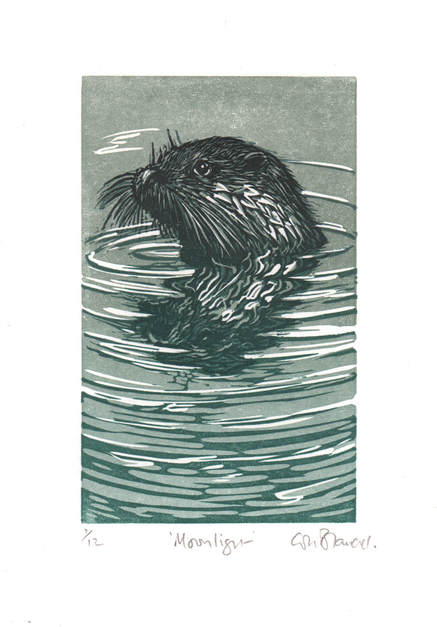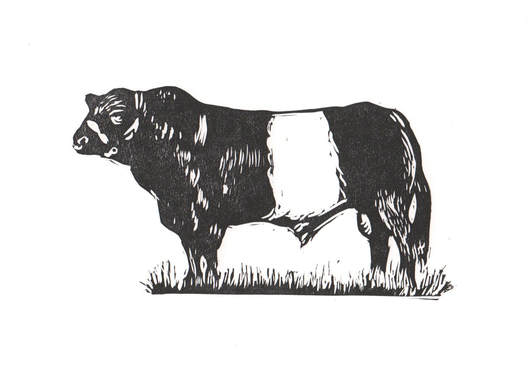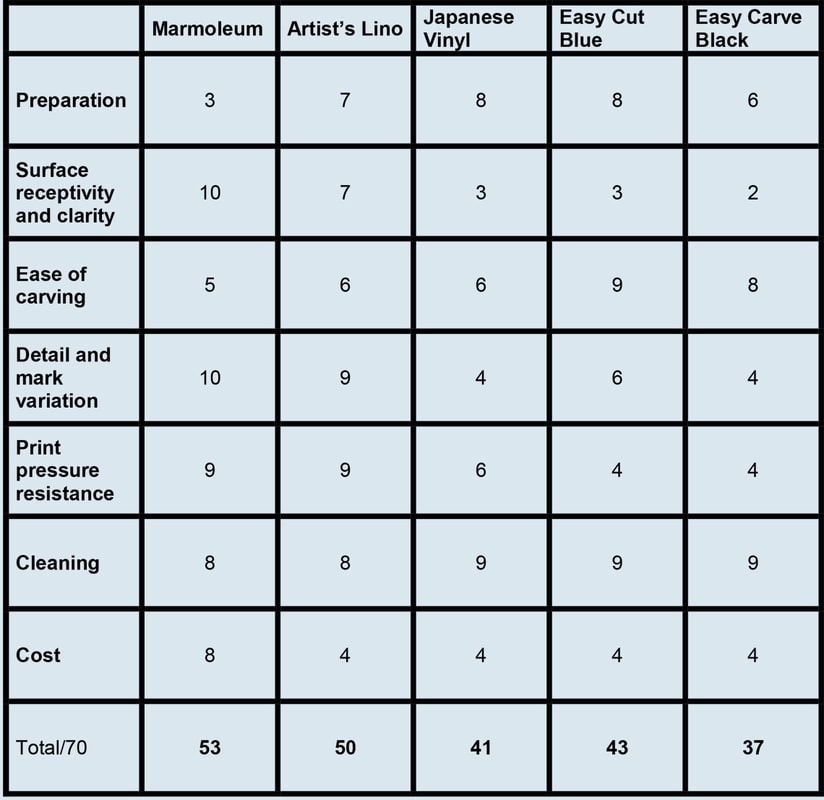First let me say that what follows is far from an exhaustive test. Indeed, I certainly didn’t test everything that is available. Nor is it a statement of comparative merit for everyone. Simply a brief record of my own little bit of research for a specific purpose and a comparison with my own preferences.
I am in the (rather long winded!) process of preparing to run some workshop courses here at Craigshaw Barns Studio. And in the interest of the fingers of any potential novice lino cutters, I thought I ought to investigate gentler alternatives to my usual commercial flooring lino.
A year or so ago had a little test cut of the pale coloured ‘Soft Cut’ in someone else’s studio, and immediately judged it just awful; sort of greasy, springy and stretchy. But I had heard of others happily using other vinyls etc, especially for beginners and thought I should at least try some more of them.
As I have described elsewhere on here, I do like my Marmoleum. Yes, it requires some preparation: the surface has to be sanded and, being quite thin, it is best glued to a backing board. But I like its smooth carving character (when its warm enough), plus its non-crumbling firmness and ability to carry print fine detail when at normal (for Scotland!) temperatures. I can also buy large pieces on a roll relatively cheaply. I can accurately draw on the sanded surface with pencil, pen and carbon paper etc; and when using the palest colour – a pale, almost white, cream – with a stained surface, I can work accurately ‘in positive’ i.e. what I cut away shows as a paler colour than the stained surface.
Proper lino also has what to me is an almost essential quality when it comes to carving accurate detail: And that is its ability to break off in a predictable way - with a ‘flick’ of the gouge. With practice, this technique enables accurate cutting into narrow angles and shapes and the creation of a wider variety of textural marks. Of course, this quality is because ‘real’ lino (made of cork and linseed oil) also crumbles if treated too roughly.
Most of these ‘alt-linos’ seem to me to be just industrial sheet materials (with all their associated non-eco production) that enterprising companies buy, cut up and re sell. At least real lino is – I believe - made from natural bio degradable materials. I should also add that although I use Caligo Safe Wash inks at the moment, I do always clean up very quickly and easily with just a few drops of white spirit rather than water and detergent/cooking oils or whatever. (Discussion for another time!) and I like to work with a solid glued together block, rather than a flimsy plate. So the problem of wetting and warping of hessian backed lino does not occur.
Although I was not particularly concerned to spend too much time and effort on some of them, I did actually make some sort of finished print (see below) from all of the alternatives - usually by the additional use of some simple screenprint over printing.
So what did I try?
Marmoleum. Made by Forbo and available through local flooring suppliers.
Normal Grey ‘Artist’s Lino; widely available and often, erroneously, called ‘Battleship’ - presumably because of its colour.
‘Japanese’ vinyl; Blue on one side and green on the other, with a black centre layer, from www.Handprinted.co.uk.
Blue ‘Easy Cut’ available from www.homecrafts.co.uk
Black ‘Easy Carve’
Brief thoughts on each of these and the little test prints done with them as follows:
I am in the (rather long winded!) process of preparing to run some workshop courses here at Craigshaw Barns Studio. And in the interest of the fingers of any potential novice lino cutters, I thought I ought to investigate gentler alternatives to my usual commercial flooring lino.
A year or so ago had a little test cut of the pale coloured ‘Soft Cut’ in someone else’s studio, and immediately judged it just awful; sort of greasy, springy and stretchy. But I had heard of others happily using other vinyls etc, especially for beginners and thought I should at least try some more of them.
As I have described elsewhere on here, I do like my Marmoleum. Yes, it requires some preparation: the surface has to be sanded and, being quite thin, it is best glued to a backing board. But I like its smooth carving character (when its warm enough), plus its non-crumbling firmness and ability to carry print fine detail when at normal (for Scotland!) temperatures. I can also buy large pieces on a roll relatively cheaply. I can accurately draw on the sanded surface with pencil, pen and carbon paper etc; and when using the palest colour – a pale, almost white, cream – with a stained surface, I can work accurately ‘in positive’ i.e. what I cut away shows as a paler colour than the stained surface.
Proper lino also has what to me is an almost essential quality when it comes to carving accurate detail: And that is its ability to break off in a predictable way - with a ‘flick’ of the gouge. With practice, this technique enables accurate cutting into narrow angles and shapes and the creation of a wider variety of textural marks. Of course, this quality is because ‘real’ lino (made of cork and linseed oil) also crumbles if treated too roughly.
Most of these ‘alt-linos’ seem to me to be just industrial sheet materials (with all their associated non-eco production) that enterprising companies buy, cut up and re sell. At least real lino is – I believe - made from natural bio degradable materials. I should also add that although I use Caligo Safe Wash inks at the moment, I do always clean up very quickly and easily with just a few drops of white spirit rather than water and detergent/cooking oils or whatever. (Discussion for another time!) and I like to work with a solid glued together block, rather than a flimsy plate. So the problem of wetting and warping of hessian backed lino does not occur.
Although I was not particularly concerned to spend too much time and effort on some of them, I did actually make some sort of finished print (see below) from all of the alternatives - usually by the additional use of some simple screenprint over printing.
So what did I try?
Marmoleum. Made by Forbo and available through local flooring suppliers.
Normal Grey ‘Artist’s Lino; widely available and often, erroneously, called ‘Battleship’ - presumably because of its colour.
‘Japanese’ vinyl; Blue on one side and green on the other, with a black centre layer, from www.Handprinted.co.uk.
Blue ‘Easy Cut’ available from www.homecrafts.co.uk
Black ‘Easy Carve’
Brief thoughts on each of these and the little test prints done with them as follows:

Grey ‘Artist’s Lino
Pretty close to Marmoleum in most aspects. But – a little more expensive; crumbles more readily even when cool and the uniform grey colour is not so easy to see when carving.
This was the little three colour reduction I did with it.
Note the crumble/break off at the edge of the block on the right hand side.

Japanese’ Vinyl
Good firm feel but actually quite tough to carve for novices. The black middle is actually quite confusing and not all that clear anyway.
The surface is impossible to draw on.
Prints well and very easy to clean.
'March Dawn' One colour lino with screen printed background colour

Blue ‘Easy Cut’
So soft and quick to cut that mistakes are easily made. Although – like all these alternatives the all important ‘cut and flick/break’ technique is not possible, one can at least rub the surface of this to remove fine detailed textural cuts.
OK for total beginners.
'Thunder' Two colour lino reduction with screenprint

Black ‘Easy Carve’
Pretty dreadful stuff to be honest. Carves easily enough and – as long as you don’t get one of the slightly textured surface areas that occur in a vital bit – prints OK.
But I gave up with this Beltie Bull as soon as i had something basic to print.
Summary Scores
Conclusion
I will experiment a little more with the grey artists lino, as it does not require so much preparation; plus, not all images require the sort of textural detail that I can only get with Marmoleum. Certainly this is what I will provide for any beginners workshops I offer.
If I ever have kids in the studio to try lino, (the grandchildren are nearly old enough) my choice will be the blue Easy Cut.
I will experiment a little more with the grey artists lino, as it does not require so much preparation; plus, not all images require the sort of textural detail that I can only get with Marmoleum. Certainly this is what I will provide for any beginners workshops I offer.
If I ever have kids in the studio to try lino, (the grandchildren are nearly old enough) my choice will be the blue Easy Cut.

 RSS Feed
RSS Feed